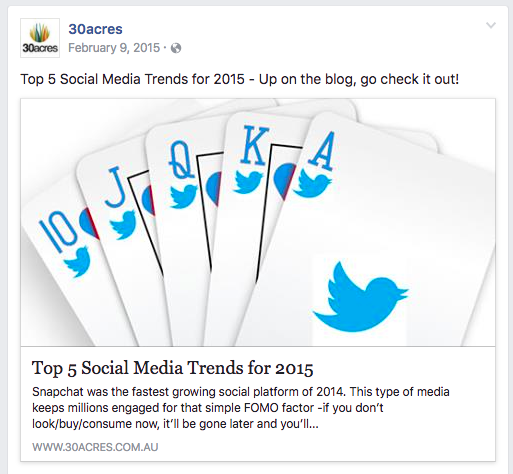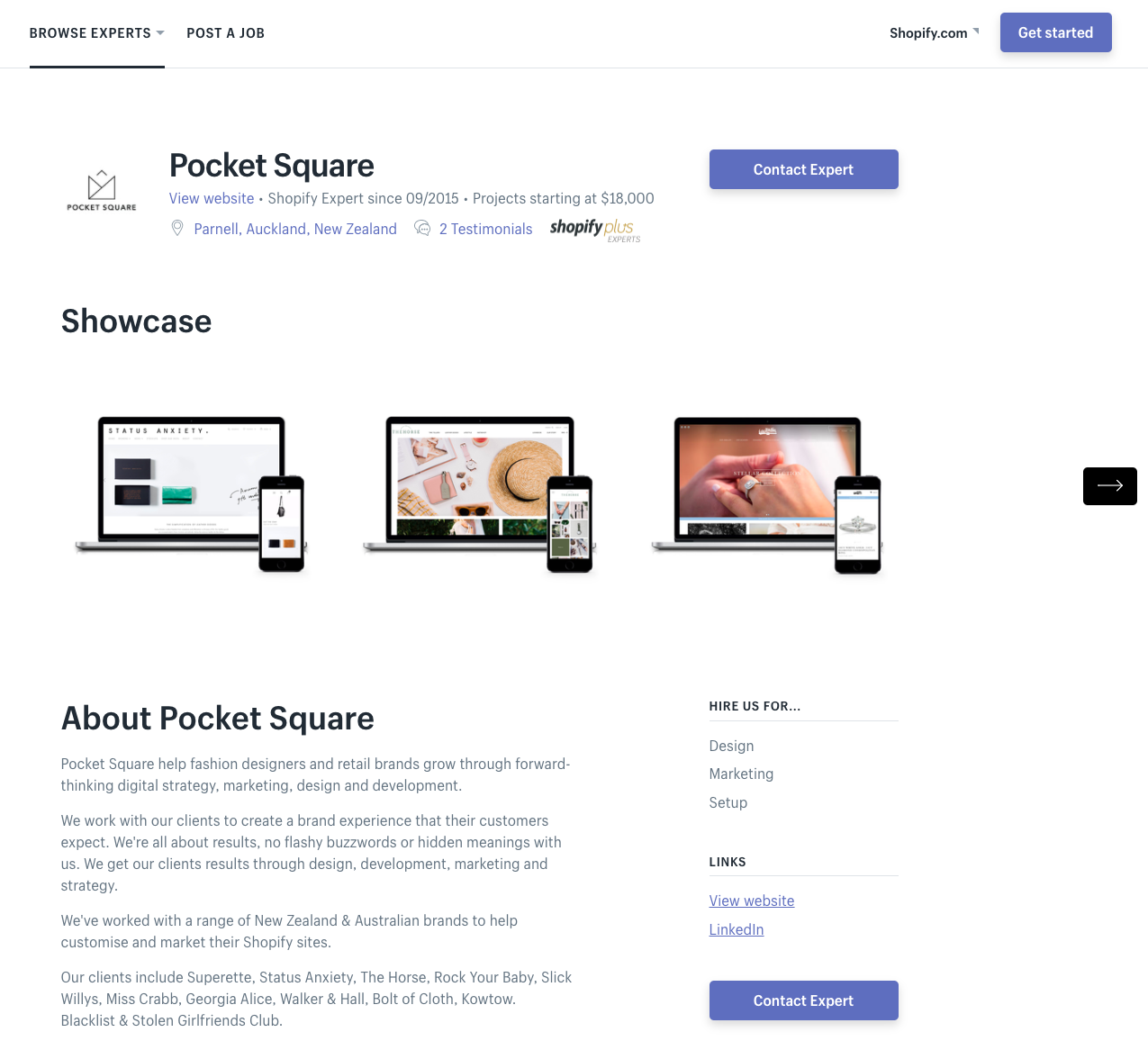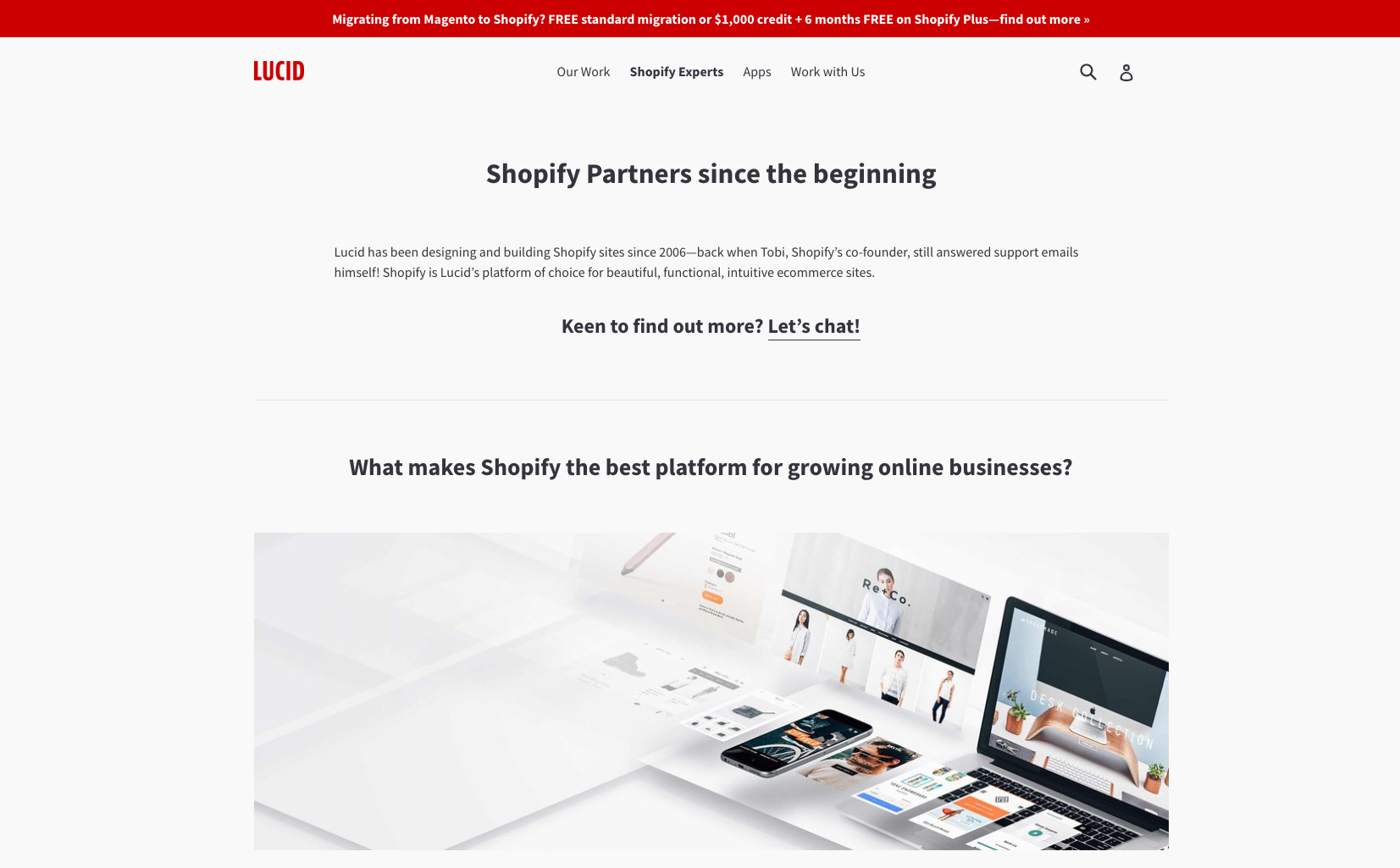As a Shopify Expert, there’s no arguing that there are many challenging aspects of working and growing in the web design and development industry. But one aspect of overall growth that’s often overlooked is building relationships within the Shopify Ecosystem .
.
Whether it’s writing Shopify-specific content, partnering with other Shopify Partners, or marketing yourself as a Shopify Expert, making time for community development can lead to mutually beneficial partnerships with Shopify, as well as fellow Shopify Experts and Plus Partners.
Actively engaging with the Shopify Partner community can also help you better position your business and attract more clients. In truth, the nature of the Shopify Partner Program is that it serves you best when approached with an attitude of reciprocity.
In truth, the nature of the Shopify Partner Program is that it serves you best when approached with an attitude of reciprocity.
That’s why today we’re pulling the curtain back, and demonstrating what successfully partnering with Shopify looks like for Experts, and how it can help you grow your business.
We sat down with Shopify Experts and Plus Partners, and asked them how they approach their successful two-way relationships with Shopify. They reveal why it’s important to bring the same professionalism and value to your status as a Shopify Expert as you would to any client project.
In this article, you’ll learn:
- Actionable advice on starting a two-way relationship with Shopify, and how it helps you grow your business.
- What makes a solid Shopify Expert profile, and how small tweaks can attract more leads.
- Best practices for marketing yourself as a Shopify Expert.
You might also like: The Ultimate Guide to Finding Web Design Clients.
The Shopify Partner community
Australian-based Partnerships Lead Rhys Furner says the foundation of building a strong relationship with Shopify and its broader partner ecosystem has less to do with money, and more to do with engaging both partner and merchant communities, while finding meaningful ways to connect and provide value.
“Shopify relies heavily on partners to ensure that merchants have a great experience with the product, and get the most out of it,” Rhys adds.
Shopify relies heavily on partners to ensure that merchants have a great experience with the product, and get the most out of it.
There are four different ways you can easily get more involved with the Shopify community .
.
1. Create content
Crafting and contributing valuable content is at the core of many vibrant online communities — and the Shopify Partner ecosystem is no different.
How it helps your business: Creating educational content that benefits other Experts, partners, or merchants will not only help you position yourself as an expert in your field, but also serves as a great way to promote your service offerings in an authentic way.

Shopify Expert Jonny Dalgleish, from digital agency 30acres, says it’s all about being prolific.
“Every little custom hack, custom app, or problem solved is worth talking about. Blog about it, put it on Facebook, add a link to your content in your email footers,” he urges. “We’ve found that if we’ve had a problem to solve, there’s a good chance someone else is going to face it too.”
We’ve found that if we’ve had a problem to solve, there’s a good chance someone else is going to face it too.
How it benefits the ecosystem: Contributing to the community in this way not only lets you share valuable lessons learned, but it gives you the opportunity to meet and work with others in the partner ecosystem (including Shopifolk who manage marketing and blogging efforts). Those connections and working relationships are what makes the Shopify community vibrant and powerful.
How to get started: You can write content for your own site or contribute to a third-party blog you admire. As a Shopify Partner, you can pitch to our Web Design and Development Blog. Take a look at our guidelines here.
Need some ideas on where to start with content? Check out these resources on content creation and how they can benefit your business:
- 7 Content Ideas That Will Drive Revenue for Your Agency
- 3 Simple Ways Your Agency Can Use Content Marketing to Build a Better Brand and Find New Clients
- Shopify Partner Session Webinar: How Our Web Agency Doubled Revenue Using Content Marketing
Pro tip: If you’re serious about submitting a blog pitch to any third-party blog, be sure to read through their guidelines carefully, and submit exactly what they ask for. Check out who their audience is, what kinds of content they’re looking for, and how they want pitches structured. If they don’t have guidelines, read some of the content on their website (which you should be doing regardless) — it will give you plenty of insight into the editor’s expectations.
Learn more about Shopify theme development and Shopify metafields to build for your Shopify clients.
2. Get active online
Shopify is fortunate to have an engaged community of merchants and partners. There are a lot of forums where merchants ask questions and partners answer them to showcase their experience and skill.
How it helps your business: Shopify Expert Jonny says that participating in Shopify’s online communities, like the forums, will help you stay up-to-date on the needs of customers, allowing you to better serve them.
“We can see trends in new requirements for apps and designs,” he says. “Being part of the forums keeps us on top of new developments with Shopify and ecommerce.”
How it benefits the ecosystem: Participating in forum discussions means you’re putting valuable and accurate information out into the community, helping both merchants and partners succeed.
Engaging online also means contributing to a community that can return the favor when the tables have turned, and you’re the one in need of a little help or the answer to an important question.
How to get started: All Shopify Partners can join the Shopify Community forums to collaborate, ask questions, and develop partnerships.
A few other places you can start participating include:
- Shopify store owner TJ Mapes’ Slack channel eCommTalk.
- Shopify Expert Jonathan Kennedy’s Shopify Entrepreneurs group.
- Shopify Community forums
Whatever forum you decide to join, jump in and respond to a range of merchant (or even partner) questions.
Pro tip: Getting active online often means crafting educational answers and putting them together in different formats, like blog posts, forum posts, books, etc. This type of content is great to sharpen your own skills, but can also double as internal resources to train staff.
3. Get some IRL time
It’s simple — the more face-to-face time you can muster with clients, competitors, collaborators, and Shopifolk, the better. Many partners host Shopify Meetups in major cities, which is a great way to meet potential leads, clients, and fellow partners.
How it helps your business: Collaborative relationships often come out of meetups , which can also help you build reciprocal relationships with fellow partners who complement your services, and vice-versa.
, which can also help you build reciprocal relationships with fellow partners who complement your services, and vice-versa.
Shopify Plus Partner Gavin Ballard of Disco says actively participating in IRL events has landed him leads and clients.
“I think the thing many people don't appreciate is that ‘real’ networking — not the sleazy ‘throw your business card at anyone who'll take it, and sell, sell, sell’ type — is a really long game, and comes from delivering value over a long period of time.”
I think the thing many people don't appreciate is that ‘real’ networking — not the sleazy ‘throw your business card at anyone who'll take it, and sell, sell, sell’ type — is a really long game, and comes from delivering value over a long period of time.
Gavin recently secured a large project with a client he first met over a year ago, when he was looking for people to speak at the first Shopify Meetup in Melbourne.
“It's been a long-term relationship,” he says. “We've stayed in touch, and now we have the opportunity to work together.”
How it benefits the ecosystem: Events that bring the ecosystem together in real life add value and energy to the community. It means that more Shopify Partners benefit from the skill-sharing and business insight shared at events, and often creates opportunities for business connections that can result in amazing things,like these six business collaborations that resulted from Shopify Unite.
How to get started: Attending meetups in your region is a good place to start, but holding meetups (solo or with the help of another partner) is a great way to get more deeply connected to the community both internal and external to Shopify.
Not only do meetups let you practice your presentation chops, but they also make your face recognizable in your local community, and help you establish yourself as a leading regional business.

“I know that being somewhat prominent in the community has helped close deals with clients who might otherwise have been on the fence,” Gavin of Disco explains.
Shopify hosts a number of different in-person events throughout the year that can help you contribute further to the community.
- Shopify’s annual partner and developer conference, Unite, recently wrapped up, but you can check out the keynotes if you missed out.
- A Day With Shopify is a series of international events with the mission of connecting Shopify Partners. It’s set to kick off later this year in five cities across the globe and is looking for speakers.
- Shop Class is a series of workshops and events that are currently travelling across Canada. While it focuses on merchants, this event series is a great opportunity to meet potential clients and provide in-person help, advice, and knowledge. Speaking spots are at times available as well.
Gavin adds that speaking at a Shopify event, whether big or small, keeps you up to date on what’s going on with the platform, but also gives you a more strategic advantage.

“For example, we were invited to speak at the Shopify Stockholm meetup, which in turn let us know that Shopify's Klarna integration was officially launching in Sweden, which makes promoting and working with Shopify in Scandinavia much more attractive,” Gavin explains.
“It also gives us the heads up on features that could open up new markets, like Japan (with proper multi-lingual support in the admin) or different types of customers (like when wholesale channel opened up to Plus merchants).”
You might also like: 4 Overlooked Tactics to Find New Clients Offline.
4. Collaborate with other Shopify Partners and Experts
Whether it’s at an in-person event or via an online forum, building relationships with other trusted agencies or freelancers often leads to mutually beneficial collaborative working relationships.
How it helps your business: It’s helpful to know other talented web designers and developers whose service offerings complement your own, as it leaves you with someone to refer clients to when the work requested is not in your wheelhouse.
Having solid relationships with industry professionals who offer similar services as you, can benefit you, too, as it means you can refer clients to another trusted agency or freelancer when taking on a new client isn’t possible due to workload or timing.
Not least of all, having other partners or Experts to bounce ideas off of, share pain points with, or even simply complain to can make your working life and business more rich and healthy.
How it benefits the ecosystem: Galen King, of New York and New Zealand-based company Lucid, has been designing and building Shopify sites, and developing custom apps and integrations for over 10 years. He notes that collaborating with fellow partners has helped him find new and interesting opportunities.
“We are finding that, even with a small team, our expertise and experience is becoming increasingly sought after — particularly by newer partners,” Galen explains. “As the ecosystem grows, there are more agencies selling Shopify to their clients, but they perhaps lack the experience and expertise within their teams to deliver more advanced customizations, builds, and app development.”
This means that Lucid gets an increasing amount of work from other partners who need support, but also helps ensure younger partners who haven’t yet built up the capacity or skills within their own teams are able to tackle larger, more complex projects.
“As we collaborate more often and on bigger, more advanced projects, this further develops the word-of-mouth connections we make in the wider ecosystem, and opens doors to fun and interesting collaborations,” he adds.
How to get started: Take any of the advice mentioned above: attend a meetup, write some content that engages fellow partners, or answer tough questions in a partner forum. Galen even suggests approaching those you admire in the community, saying that partners are often open to connecting. At it’s core, collaboration comes down to figuring out and nurturing a community relationship, so take your learnings and apply them!
What you can do outside the community
There are a few other ways, outside of getting involved in the Shopify community, to improve your two-way relationship with Shopify. These tips focus more on how you present yourself, and your business, to the world, as well as how Shopify fits into your well-crafted business persona.
5. Create a stellar Experts profile
An Expert profile is the page that lives within the Shopify Experts Marketplace. It’s the face of your company and brand within Shopify. When Shopify merchants come looking for a Shopify-recommended service provider, this is the page they will find.
How it helps your business: Your Shopify Experts profile signals to those who have already bought into the platform that as a business, you’re experienced in using the Shopify platform, and can help them get the most out of it.
“We’ve worked on the Shopify Platform for a number of years now, and have worked our way up to becoming Shopify Plus Partners,” explains Lance O’Grady of digital agency Pocket Square. “In our market (New Zealand and Australia), this has given us a huge point of difference.”
How it benefits the ecosystem: An impressive Experts profile benefits merchants first and foremost, as it means they can quickly and easily understand who you are and what kind of value you offer. The long-term benefit is that happy clients make recommendations, meaning that if a merchant finds the Experts Marketplace an easy place to navigate, and found a good fit with a Partner, they’re more likely to recommend the marketplace to others, meaning more business for all.
Shopify Partnerships Lead Rhys adds that setting yourself apart from the crowd is vital to client acquisition, but also helps ensure the right kind of clients (i.e. the high value ones) are coming to you.
“The marketplace makes it easy for merchants to compare a lot of partners quickly, so try to find ways that will make you stand out, while also being clear on the type of client you want to work with,” Rhys says.
How to get started: You need to think of your Expert profile as an extension of your website. The same professional polish you put into the online face of your business should go into your Expert profile. That means including the basics, like:
- Recent client testimonials
- High resolution/quality screenshots
- Detailed examples of past work
It’s important to also note that the Expert Marketplace ranks Experts based on three key factors:
- The amount of testimonials added, as well as how recent they are.
- The number of development stores launched though your Partner Dashboard, and how recently they were launched.
- How quickly you respond to enquiries through your Partner Dashboard.
Lance ensures Pocket Square’s business profile is rock solid by including an overview of services provided, as well as examples of the quality of their work and past client projects. The goal is to give prospective clients an introduction to what Pocket Square does.
“We like to include key information that makes our agency different, including our specializations and key clients.”
We like to include key information that makes our agency different, including our specializations and key clients.

It’s important to reply to all enquiries, even if they’re not the right fit for you. Not only does it help raise the professionalism of the marketplace as a whole, but it will help you rank higher within it, which naturally helps you attract better quality leads. Plus, you never know what might come of responding professionally and courteously — they might not be the right fit now, but who knows about future work.
Want to learn more about best practices for the Expert Marketplace? Check out this page on how to win more business through your Expert profile.
Pro tip: In addition to the look and feel of your profile, it’s important to consider experimenting with pricing models in the Experts Marketplace. The “pricing from” option gives you the ability to test out different prices listed on your profile, in turn helping you ensure you’re finding the right types of leads, with the right types of budget.
You might also like: The Ultimate Guide to Getting Powerful Client Testimonials (With 6 Simple Questions).
6. Market yourself with the Shopify Expert brand
Marketing yourself as a Shopify Expert is key to maintaining a two-way relationship with Shopify.
Whether it’s declaring your Shopify Expert status somewhere in your portfolio site copy, using Shopify badges on your social properties, or creating valuable blog content that positions you as such, being a Shopify Expert should come as no secret to potential clients.
How it helps your business: One of the most effective ways to brand yourself as a Shopify Expert is to include a landing page on your portfolio site to promote any Shopify development services you offer. Many Shopify Partners use this tactic, and while it helps market your services to leads, it can also benefit your business in several other ways. It can help:
- Educate and upgrade your existing clients.
- Add content to your portfolio.
- Establish your thought leadership within the Shopify community.
- Show your expertise to the world.
- Drive traffic and acquire new leads.
Check out Shopify Content Marketing Lead Simon Heaton’s article on the benefits of a Shopify landing page and how to make one, for a full breakdown.
Positioning is so important to Shopify Plus Partner Bodog Olah of digital agency Createur, that the digital agency is currently in the midst of redesigning their website to include a Shopify-specific service page, with additional qualifiers for Shopify Plus.
“A dedicated page for your Shopify services allows you to summarize the benefits of Shopify itself over other ecommerce platforms, while at the same time qualifying yourself as an Expert,” Bo explains.
A dedicated page for your Shopify services allows you to summarize the benefits of Shopify itself over other ecommerce platforms, while at the same time qualifying yourself as an Expert.

How it benefits the ecosystem: Branding yourself as a Shopify Expert is particularly important for attracting clients who are looking to hire for big jobs, like replatforming. Merchants who want to move from other ecommerce platforms to Shopify are often looking for someone they can trust with the mammoth task.
You hold their business, their livelihood, in your hands. Communicating that you have the tech and business savvy to handle such an awesome responsibility — via the branded title “Shopify Expert” — will help put a merchant’s mind at ease.
How to get started: If you’re tackling Shopify Expert branding with a dedicated landing page, be sure to include high-level details about Shopify in relation to your service offering, samples of your existing Shopify work, and a call-to-action that’s accompanied by a contact form (this helps potential leads avoid having to navigate around your site).
Bo adds that it’s important to take advantage of the strong SEO benefit of having a dedicated Shopify services page. When this page is cross-linked to your Expert Profile in the Shopify Experts Marketplace, the relevance between the content on both pages will be complementary and help keep that SEO juice flowing.
In addition, Bo says including Shopify-specific case studies for common client requests are extremely valuable.
“They give prospects comfort that you’ll be able to handle their more specialized requests,” he explains. “They’re also an easy-to-use tool, as they can display the data and accomplishments you want to promote to leads.”
You might also like: How to Write a Web Design Case Study that Lands New Clients.
Think not what Shopify can do for you…
It might seem counterintuitive, but the benefits of contributing to the Shopify Partner ecosystem will pay you back tenfold , and help you build a business that’s healthy and able to stand the test of time.
, and help you build a business that’s healthy and able to stand the test of time.
Read more
- 10 Accounts to Follow on Instagram for UX & Web Design Inspiration
- How to Build a Shopify App: The Complete Guide
- Getting Started with Shopify Scripts: A Practical Walkthrough
- Tips for an Efficient Shopify Theme Review Process
- How to Optimize Your Client's Ecommerce Store in Response to COVID-19
- Email Deliverability: 5 Ways to Build a Strong Sender Reputation
- 7 Ways to Create an Amazing Customer Experience for Your Clients’ Ecommerce Stores
- Why Can't We Be Friends: Finding the Balance Between Marketing and Design
- What You Missed at Generate Conference 2014
- How to grow your business by becoming an omnichannel expert
Did we miss anything? Let us know how you like to engage with Shopify Partner community in the comments section below!

